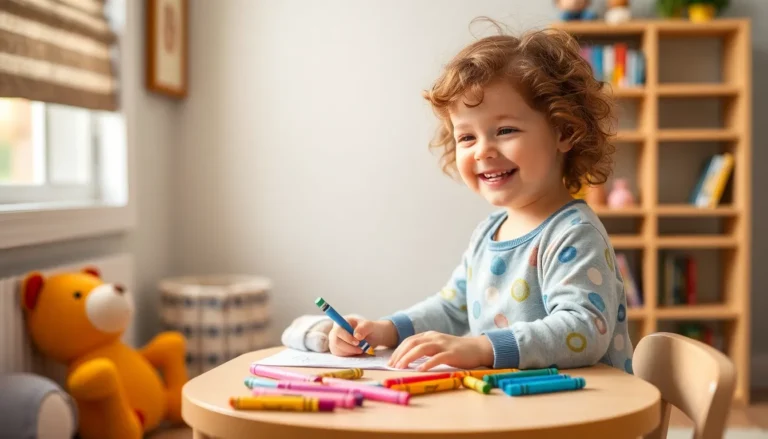Table of Contents
ToggleIn a world where kids juggle school, friendships, and the occasional existential crisis over pizza toppings, mental health often takes a back seat. But what if a few simple words could spark a smile and lighten their load? Enter the magical realm of mental health quotes for kids. These nuggets of wisdom not only provide comfort but also teach resilience in a fun and relatable way.
Importance Of Mental Health For Kids
Mental health plays a crucial role in children’s overall development. Recognizing the significance of mental well-being helps kids thrive in various aspects of their lives.
Emotional Well-Being
Emotional well-being affects how children think, feel, and behave. Kids face pressures from school and social interactions. Quotes about mental health can provide reassurance and promote positive self-talk. Consistent encouragement builds resilience, allowing children to cope with challenges. Engaging with mental health quotes can also foster empathy, enabling kids to understand their own emotions and those of others.
Social Development
Social development hinges on a child’s ability to interact with peers and family. Positive mental health influences a child’s confidence in social situations. When children feel emotionally secure, they communicate better and build stronger relationships. Using mental health quotes can inspire kids to express themselves openly. Sharing quotes in group settings encourages discussions about feelings, leading to improved social skills and increased empathy towards peers.
Inspiring Mental Health Quotes For Kids
Mental health quotes can uplift children’s spirits and encourage positive thinking. These quotes resonate with kids, helping them navigate their emotions.
Quotes About Resilience
“Fall seven times, stand up eight.” This Japanese proverb illustrates the importance of persistence. Resilience means facing challenges head-on and bouncing back stronger. Another powerful quote states, “It’s okay to not be okay, as long as you don’t stay that way.” This encourages children to express their feelings while reminding them that recovery is possible. Engaging with these quotes fosters motivation and determination among kids, teaching them the value of overcoming obstacles.
Quotes About Self-Love
“Be yourself; everyone else is already taken.” This quote, attributed to Oscar Wilde, highlights the importance of embracing individuality. Self-love is crucial for developing confidence and a positive self-image. “You are enough just as you are,” reinforces the idea that kids don’t need to change to be valued. These quotes inspire acceptance of oneself, helping children appreciate their unique qualities. Encouraging self-love promotes mental well-being, driving kids to treat themselves with kindness and compassion.
How To Use Mental Health Quotes
Utilizing mental health quotes effectively can have a positive impact on children. They serve as catalysts for conversations about feelings and well-being while promoting self-awareness and understanding.
Encouraging Discussions
Engaging with quotes invites children to share their thoughts and feelings. Parents and educators can ask open-ended questions about specific quotes, fostering deeper discussions. For example, asking, “What does ‘Fall seven times, stand up eight’ mean to you?” encourages children to think critically about resilience. This technique not only normalizes conversations around mental health but also strengthens emotional bonds. Creating a safe space for sharing enhances trust and openness. As kids express themselves, they learn valuable communication skills and develop empathy toward others.
Promoting Positive Mindsets
Incorporating mental health quotes into daily routines reinforces a positive mindset. Displaying quotes in common areas, like classrooms or bedrooms, serves as daily reminders. For instance, rotating quotes such as “It’s okay to not be okay, as long as you don’t stay that way” can boost resilience and self-acceptance. Encouraging children to repeat these quotes aloud can further instill confidence. Establishing a habit of positive self-talk helps combat negative thoughts. Promoting a culture of kindness through affirmations nurtures emotional well-being and cultivates a supportive environment for all.
Activities To Reinforce Mental Health Messages
Engaging children in activities reinforces the significance of mental health messages effectively. Creative expression and artistic endeavors serve as powerful tools for this purpose.
Creative Writing Prompts
Writing prompts can spark children’s imagination while focusing on mental health themes. “Describe a time you felt brave” allows kids to reflect on resilience. “Write a letter to your future self” encourages them to consider their goals and aspirations, fostering self-awareness. Another prompt, “What makes you unique?” promotes self-acceptance and positive self-image. By sharing their stories in a group, children develop communication skills and build confidence, creating an atmosphere of emotional support.
Art Projects
Art projects offer a visual way to express feelings and reinforce mental health messages. Creating a “Feelings Wheel” lets kids identify and articulate emotions through color and shape. “Self-Portrait Collages” enable them to represent their individuality and celebrate diversity. Additionally, crafting “Affirmation Posters” encourages positive self-talk, enhancing self-esteem. Displaying these projects in communal spaces promotes ongoing discussions and fosters an open environment for sharing thoughts and feelings. Engaging in these artistic activities supports emotional growth while solidifying the importance of mental health insights.
Mental health quotes serve as powerful tools for children, helping them navigate their emotions and build resilience. By incorporating these quotes into daily life, kids can develop a positive mindset and foster deeper connections with their peers. Engaging in discussions around these quotes not only enhances communication skills but also nurtures empathy and understanding.
Creative activities further enrich this experience, allowing children to express themselves in meaningful ways. As they embrace their individuality and learn to cope with challenges, mental health becomes a priority in their lives. Ultimately, fostering a supportive environment centered around mental well-being equips children with the tools they need to thrive emotionally and socially.







